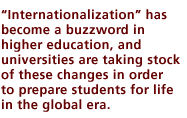Dean's Column
by Dean Samuel H. Preston
Expanding Perspectives for a Shrinking World
Our world is shrinking--assuming an interconnectedness unseen in human history. "Internationalization" has become a buzzword in higher education, and universities are taking stock of these changes in order to prepare students for life in the global era. But what exactly should the modern international education entail?In SAS, students can study 57 foreign languages, the largest offering of any Ivy League school. Our students take courses in comparative literature, history, politics, and economics that cover virtually every inhabited part of the planet. Through Penn's Foreign Languages Across the Curriculum program, many of these nonlanguage courses are taught in a foreign language. Study abroad programs are more popular than ever, and two joint degree programs that capitalize on the special strengths of SAS and Wharton prepare students for careers in international business.
The analysis of institutions, cultures, and social phenomena around the world is often most effectively organized through area studies programs. The concept of interdisciplinary area studies became an important model for international scholarship in the Cold War era, and many universities have designed their approach to international studies around that model. Today, faculty research on international topics is showcased in several distinguished research centers in SAS. The majority of these centers focus on a specific area of the world, such as Africa, East Asia, or the Middle East.
 But it is also true that, with accelerating interconnectedness, analysis must now extend across regions. The story of how cultures and institutions are responding to the growing density of interregional contact is perhaps the greatest theme in the social sciences and humanities at the century's close. As part of a Ford Foundation initiative called Crossing Borders, Penn is looking at ways to promote cross-area study. Two large-scale faculty research projects are being sponsored through this effort.The first is examining the role of media in maintaining and transforming boundaries between the indigenous and the European communities within Latin American nations. The second effort is looking at the differing, often conflicting ideas about the body, disease, and medical knowledge in African society. This research explores both the movement of medical knowledge among the Americas, Asia, and Africa, and the rich local medical practices in Africa itself.
But it is also true that, with accelerating interconnectedness, analysis must now extend across regions. The story of how cultures and institutions are responding to the growing density of interregional contact is perhaps the greatest theme in the social sciences and humanities at the century's close. As part of a Ford Foundation initiative called Crossing Borders, Penn is looking at ways to promote cross-area study. Two large-scale faculty research projects are being sponsored through this effort.The first is examining the role of media in maintaining and transforming boundaries between the indigenous and the European communities within Latin American nations. The second effort is looking at the differing, often conflicting ideas about the body, disease, and medical knowledge in African society. This research explores both the movement of medical knowledge among the Americas, Asia, and Africa, and the rich local medical practices in Africa itself.
Using these projects as models for cross-area research at Penn, we have established the Interareal Council with representatives from our many fine area studies programs. Such initiatives require not just collaboration among individual faculty but also a greater consolidation of resources across departments and the creation of undergraduate courses on cross-area topics. The Council is an important vehicle for the ongoing study of international issues in terms of both faculty research and curricular reform. It also serves as a reminder of Penn's continued tradition of excellence and innovation in international studies.